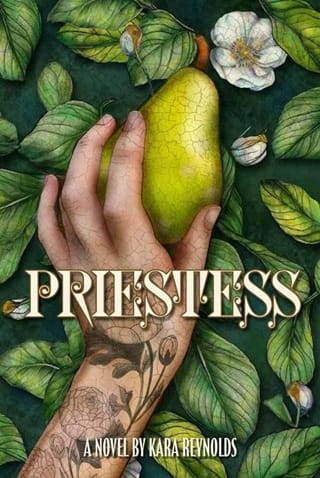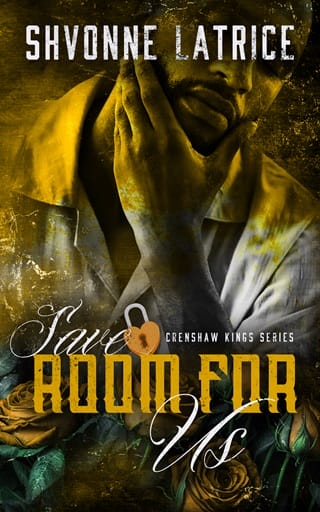3. Curse
Strength from within must have guided my hand to the office door’s handle.
“No, no, no, no,”
whispered Maureen.
Behind me Eefa choked on a sob while her mother shushed her.
“Agnes, please, Agnes,”
said Helena.
I heard Quinn, in a hushed tone, telling River something, holding her sister close.
Slowly, the creak of the hinges loud and echoing, I pulled the door inward.
We looked at them and they at us.
What looked like fifty men, but later we would understand to be twenty, stood in the aisle leading up to the podium.
Each of them were clad in dark leather breeches and boots.
The famous black Tintarian armor was scant on them, breastplates with a large shark tooth carved into the metal with vambraces on their arms.
It had to be scant as the rest of their bodies were dressed with weaponry.
Each man had a sword on one hip and a dagger strapped to one thigh.
Large black shields were slung from their backs so that each man had a black half-moon shape behind his head, which gave them a vaguely reverent appearance, as if death, while vicious, was also sacrosanct to the deliverer.
The man who had spoken first, spoke again.
“I said to come out.”
He did not raise his voice.
He did not need to.
It carried without volume.
A desire to piss myself overcame me and I flexed the muscles in my legs.
My mad theory had to now be tested.
I closed my eyes.
Then I stepped forward, my right hand outstretched, palm facing the speaker.
And Saint Agnes herself must have spoken through me, for my voice was as steady as my murderer’s, even if my bladder threatened to release.
“This is a temple! A chapel!”
I pronounced.
“We are priestesses of Saint Agnes.
Your sanctuary doctrine protects private holdings and religious institutions.”
I spoke quickly for I did not know how much time we had.
“We respect your right to invade when our city-state failed to honor trade agreements.
We do not stand in your way.
We only ask that you hold true to your own sanctuary doctrine.”
Behind me was the collective hush of the others.
In it, I could hear the tears held back, the inhales burning in their lungs, the pleading they were desperate to do.
My eyes focused on the speaker.
He wore the same leather and black armor, but he was clearly their leader.
He was not the tallest or the broadest of them, but something in his manner, the way he carried himself, the angle of his head made it obvious.
He was perhaps the oldest though, his close-cropped brown hair had gray at his temples and the lines between his brows and on his forehead were deep.
He was thin but well-muscled, his cheekbones high on his face.
His nose was once broken.
His mouth sat naturally wide across his face but the slenderness of his lips made it seem like a slight sneer.
He blinked, slowly, like a wolf watching deer.
“Madam, the citizens of Eccleston pay for this building.
And you know that.”
“Shit,”
I heard Mischa behind me.
I smiled, inhaling and exhaling through my nose.
I was buying time but at what price? As I opened my mouth, unsure of what would come out, he unsheathed the sword at his hip.
The scrape of the metal on the inside of the scabbard hit the inside of the chapel and was amplified by the small stone room.
“No,”
shouted Helena. “No!”
The other men unsheathed their swords.
In no rush, but at a steady pace, they began to advance.
The shrieking in unison behind me frustrated me because I could not think, but then I realized I had begun to shriek too.
We were without recourse.
“You will be cursed! You will be cursed by Agnes!”
Helena shouted.
This did not stop them.
I began to shout too.
“You will be cursed! You will be cursed by Agnes!”
I lifted my arms and corralled the others behind me as I shouted.
The other women followed suit.
“You will be cursed! You will be cursed!”
“We are her sacred priestesses!”
Mischa screamed.
“Alric,”
said the tallest of the men behind the leader.
“Alric.”
I noticed his steps falter and I shouted louder.
“Perch,”
said the leader.
“You will do your duty.”
His tone was not angry but it sounded as if he was clenching his teeth.
“What if they’re telling the truth?”
The tallest man argued, quietly so as to show some modicum of respect for his superior.
This man’s hesitance spread amongst the group.
Other men halted in their steps.
Our shouting stopped as we, and the rest of the soldiers, watched the leader.
He exhaled, lowering his sword.
“Eccleston is a godless city.
This is not even a temple.
It is a kind of employment office and I am your commanding—”
The tall man also lowered his sword and held up his other hand, cutting off his leader.
I noticed his hair was different from the leader, long and gathered in a knot at the back of his head.
“Alric, I don’t think we should risk it.”
Another man, thickly bearded and with a shaved head, standing next to him, also lowered his sword and shook his head.
Then he chuckled.
It was a completely inappropriate noise and sounded all the more impertinent in a chapel.
“You are a backwater fool, Perch.
My gods, man.
We’re here to cut them down.
You don’t even know this Agnes.
You are superstitious sea scum.
Superstitious about everything.”
The man with long hair sheathed his sword and put his hands on his hips.
“I’m not being cursed for the rest of my life because of this lot.”
He inclined his head towards us.
The bald man burst out laughing in full this time.
“Perch, you’re bloody raving.
I’ll buy you ten talismans when we get home.
Cut their godsdamn throats.”
The man named Perch drew his brows together.
He cut quite an impressive figure with his height and hair.
I noticed he had a neat beard as well.
“Well.
I’m not doing it.”
“I’ll make you a bet then.
We kill them and don’t get cursed, you buy my beers for a full season.
We do get cursed and I’ll apologize.
To your face.”
The tall man grimaced.
“Always a jester.”
I noticed the other men had lowered their swords and were watching the three men at the front, the leader and the two arguing.
My arms began to ache but I held them, a flimsy shield.
The leader sheathed his sword, his face blank.
When he spoke, it was with a measurement of patience.
And it was without feeling.
“Perch.
Thatcher.
This is entirely unfitting behavior of a Tintarian soldier.
And it is twice as unfitting as we are not soldiers, we are procurers.
Most ranking officers would have you whipped.
In a word, this is insubordination.”
There was a stillness after he spoke.
His men watched him carefully.
“Apologies, captain,”
said the bald man.
The tall man nodded, but his face looked troubled.
I sensed an opportunity and I took it.
“Your soldier is right,”
I said, as calmly as I could manage.
I directed my words to this captain.
“There is a reason Eccleston has never been in a war.
And it’s because of Agnes.
Her blessings have covered us.”
The man looked at me.
“Priestess,”
he said as if the word rang false to him, as if somehow he knew.
“The reason Eccleston has never been in a war is because your fair city has honored all agreements and all treaties up until this past winter.
Tintar abides by agreements.
All of our agreements.
And within the language of every agreement, we reserve the right to restrained invasion if they are broken.
Eccleston has broken with us.
And so we invade.
Only governing bodies, of course, as they were the ones to break the agreement.
And this—”
he gestured to the white stone walls around us, “is paid for by your citizens’ taxes.
And is thus… a governing body.”
My gaze went to the tallest man.
Both he and the bald man, surprisingly, seemed swayed by my words.
They were a religious people, I told myself.
The faces on some of the other soldiers held the same concern.
“Take us as captives,”
I said.
I heard intakes of breath behind me.
“If you cannot leave us be, take us as captives and there will be no curse.”
The captain’s eyelids remained where they were but his brows rose.
I noticed then they were defined and well-shaped.
“Captives,”
he said, almost to himself.
Behind him, his men held still, swords out but lowered.
Through the shattered doors, people rushed by on foot and on horse.
The volume of the fighting and screaming was louder than it had been and yet, inside this odd impasse, in this chapel, it seemed far away.
“Yes,”
I rushed on.
“Captives.
You can hold us hostage.
Use us to barter with Eccleston for a fresh trade agreement.
Eccleston holds Agnes clerics in high regard.
We are valuable.
I’m sure the council has learned its lesson with your invasion, but we could be useful in the recreation of such agreements.
And you would not be cursed by the spirit of Agnes.
In fact, she may see our captivity as a kindness.”
He looked at me closely then, as if noticing I was a woman and not just a terrified person in white.
A flicker of something passed through his eyes as they flitted over me.
Then, as if dismissing me, he turned and faced his soldiers.
They stood at attention.
“I will allow for a vote,”
he said.
“Cut them down?”
he asked, raising his own hand.
Six men lifted their hands.
He let his hand fall.
“Well.
Captives it is.”
There was a crush of released breaths behind me.
“See if the office has a window,”
he ordered the tall man named Perch.
Perch stepped past us to look.
“Nothing.”
“Good,”
said the captain.
Turning to us, he said, “You will go into the priest’s quarters and stay there.
Two of my men will guard you.
Do not try to leave.
If you do, you will be cut down.
Two more men will be outside guarding this chapel.
We will collect you at some point this evening.”
He looked to some of the men, a slight nod of his head all he needed to do and two approached us.
We scurried into the priest’s office before they could reach us.
As we moved away, I watched him turn to Perch and the bald man.
“Let us continue,”
he said.
“Without any curses.”
Then he strode past the rest of his company and out through the doorless archway.
“You’ve gone and done it now,”
the man with the shaved head said to Perch.
“Go and fuck yourself,”
said Perch.
They hurried after him with their fellow soldiers.
The two guarding us were younger than the three men who had been speaking, perhaps each in their mid-twenties.
They positioned themselves outside the office door and faced the pews.
Quinn reached to close the door and one barked “open.”
She pulled her hand away.
We huddled around the priest’s desk, breathless, listening to the mayhem in the street.
“I can’t believe it worked,”
said Maureen, tears still wet on her face, the ink on her cheek streaking.
Then she clapped her hands over her mouth.
“Brilliant,”
said Mischa, glaring at her.
Maureen glared back.
“We should discuss nothing,”
said Quinn, more mouthing her words than saying them.
“You are quick on your feet.”
She looked at me with a respectful dip of the chin.
Somewhat proud, I thought to myself that she likely did not often give compliments.
Eefa was still crying, but her mother had regained some composure.
“Yes, that was really good.
Really good thinking.
Edie was it?”
I nodded.
“That’s Helena, Maureen and Mischa.
We work at the scriptorium.”
“All of us in the wrong place at the wrong time,”
remarked Catrin, dabbing at her nose.
“The worst place at the worst time,”
sighed River, tearful but serene.
“What will happen to us?”
asked Bronwyn.
“I think we’re in for a very long journey,”
Helena responded.
“A very long journey to Tintar,”
added Mischa and then, my plucky sister scribe, always with a retort, always brash, an independent woman who had never accepted a marriage proposal or a defeat, began to cry. “Brox,”
she wept.
“He’s probably dead.”
“Your husband?”
asked Catrin.
Mischa shrugged, her eyes wet.
“He’s my man.
He’s a capitol guard.”
And that realization, that Brox guarded the buildings targeted in a restrained invasion, hit me.
And in my grief for Mischa, who had lived with Brox for winters, refusing his hints at finally wedding each other, but seemingly happy with him, I thought of Levi with his wicked grins and his roaming hands.
And then I thought of the people I had known over ten winters in this place.
Had they survived? Did they find cover?
The notion was contagious and around me, everyone began to cry.
Helena had the same small shock as me, our bold Mischa in tears being a strange sight.
Our eyes met and her lips pressed together.
“Quiet!”
said the guard who had yelled at Quinn.
“Tristan.
Let them be,”
said the other guard.
He turned and looked in the doorway at us.
He was even younger than I had first thought and had a handsome face.
I saw the moment his eyes lit on Maureen.
She was pressing her inky cheek against her mother’s, not seeing him, but he was transfixed.
My mind took note of this.
I did not know what our next days would look like, but we were prisoners and at no advantage.
While I, who saw myself as an aunt to Maureen, having known her since she was a girl of seven, would never put her in harm’s way, I could not help but see this young man’s interest as a good thing.
“What is your name?”
I asked him, trying to smile.
I must have looked insane, tears on my face, one side blotchy with blue ink.
“Quiet!”
came the voice of the first guard.
The handsome one pulled himself back outside the office.
But before he did, I watched him tear his eyes away from my Maureen to look at me.
And in his eyes I saw, yes, a Tintarian killer, but also a boy who had just seen a pretty girl and wanted to speak to her.
He had been about to answer me with his name.
I looked back to Maureen and saw Helena had noted it too, but her eyes were full of worry.
And then, later than Helena had, I thought of the unspoken thing all women must worry about, that dark shadow that looms and never leaves.
“We’re priestesses,”
I mouthed at her.
“They’re religious.”
She bobbed her head, but her expression was still upset.
I continued to speak to her without sound.
“It will be alright, kindred.”
It was our term of endearment for each other.
Neither of us had had sisters and both of us had endured dissatisfied husbands and dashed dreams.
We had invited Mischa to use it and she sometimes did, but it had just been the two of us in the beginning, both lone women with pasts trying to feed ourselves and make livings with scribe work, hoping to find some small happiness in life.
She gave me a feeble, upward quirk of her mouth.
I knew our priestess act was a cold comfort.
I also knew Tintar to be a somewhat savage people and their religion centered around nature.
It was not like Rodwin’s piety and pureness or Agnes’s wisdom and resourcefulness.
But I also sensed they had an abiding respect for faith in general.
I looked to River.
We would need her knowledge of Tintar.
My mind continued to ruminate.
We were as a winter traveler crossing a river, hoping the ice is thicker than thin, more solid than bubbled.
We had to operate carefully.
This ruse would be the only guard against our deaths.
We could not, even as we were rightfully allowed it, let our grief consume us.
“Quinn is right,”
I spoke, slightly above the muffled tears, but low enough so as not to draw the guards’ attention.
“Do not speak unless you must.
Do not act or do or say anything you think does not become a cleric.
This priestess deceit is the only thing keeping us alive.”
I said the last sentence with little to no sound.
“Yes.
We cannot give ourselves away,”
said River, also quietly.
“What will happen?”
Catrin asked.
“She doesn’t know,”
said Mischa, somewhat brusquely.
“None of us do.”
I held up my hands.
“Strangers we may be, but they all think we’ve served Agnes alongside each other.
Be gentle.
Speak gently.
Act like you care about your fellow prisoner, please.”
I looked toward Mischa.
“And aside from acting so as to perpetuate this priestess ploy, we are in hell together now.
Let’s be good to one another.
Whatever may come.”
Mischa sort of sniffed at Catrin, which, Catrin may not have known, was an apology from Mischa.
I looked at my friend with her cornsilk curls and plentiful curves.
She was alluring in her own audacious way and her personality was, if at times ornery, quick to make amends.
She was my family in this city, like Helena and Maureen.
I had known them nearly as long as I had had my freedom.
But unlike the three of us, Mischa had had someone.
Winters before we met, Helena’s miserable husband, tired of waiting for a son, had deserted her and little Maureen.
Like me, she was still married, if by technicality.
She had devoted her life to Maureen’s upbringing.
We all had relationships and friendliness here, but no one man and no one by blood.
But Mischa had been with Brox for winters.
She had often complained about him, saying he had become selfish in bed, that he never picked up after himself.
But there are worse men in this world.
And she, fiercely self-sufficient and pleasant to look at, could have left or met a new man at any time.
But she had not.
And he had been jovial and even kind.
I thought then of his kindness towards me.
When I could finally afford something other than boarding houses, he had helped me move my belongings into rooms above an apothecary.
He had walked all of us home after many a late festival night.
In a tavern, last winter, before snow began to land on Eccleston’s spires, I had been with Mischa, waiting with her while she bemoaned Brox’s lateness.
I had promised to stay and drink with her until he came.
He had entered with fellow capitol guards, still in uniform.
After kissing a purse-lipped Mischa, he had turned to one of his friends and, head tilted at me, said, “This is the one I said was too good for you.”
And then Brox had winked at me and said, “Be nice to him for a minute, love.
Women that look like you don’t often have the time for men like him.”
I had blushed, like I was Maureen’s age, and turned to politely smile at Levi.
I put my hands over my face to staunch any further grieving.
It had not been love.
I had not been in love since marrying Thrush, but Levi had been generous, both in body and words.
He had taken the time to tell me what he liked about sharing my bed, praising my face and my form, often bordering on the romantic.
Casual lovers have no need for that, but he had done it regardless.
And done it sincerely.
And now he was dead.
And so were hundreds of others.
A restrained invasion was a Tintarian term.
It meant, as the flint-faced captain of our new captors had said, only governing bodies would be struck down.
But it was still an invasion and they had still slaughtered Ecclestonians.
And, as I looked from woman to woman, I thought, we were still prisoners of war.
And I could not help but worry that my impulsiveness had condemned us to something worse than death.
 Fullepub
Fullepub 



